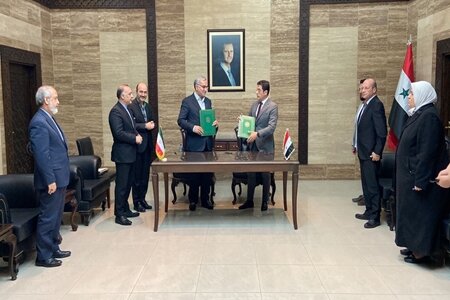Tehran, Damascus ink ‘health diplomacy’ document

TEHRAN – Iranian Health Minister Bahram Einollahi and his Syrian counterpart Hassan Muhammad Al-Ghabash signed two memorandums of understanding (MOUs) to promote health diplomacy.
In a meeting held in Damascus on Thursday, Einollahi stated that health diplomacy is very effective in expanding cooperation, and the two countries can complement each other in the field of health.
Al-Ghabash also highlighted that these agreements must be implemented quickly, emphasizing the expansion of joint cooperation between the two nations, according to the Health Ministry’s website.
Under the first MOU, joint cooperation will be developed in the fields of health system promotion, science, education, research and technology, health services, and medicine and equipment.
The second MOU was on the development of cooperation in the field of supply and facilitation of trade and export of drugs and medical equipment, facilitating the cooperation of pharmaceuticals and medical equipment.
Development of pharmaceuticals, medical productions
The import of pharmaceuticals has declined in Iran by 91 percent, which shows the capability of the country’s pharmaceutical industry, Mohammad Reza Shanehsaz, former head of the Food and Drug Administration, said last October.
The two sides will develop cooperation in the fields of education, research and technology, health services, and medical equipment. Today, all medicine used in the treatment of coronavirus are produced by domestic manufacturers, and if we wanted to import all the items, there would be a high exchange rate, he further stated, emphasizing that COVID-19 vaccine development indicates the pharmaceutical industry’s capability.
In 2018, 67 percent of the active pharmaceutical ingredients (APIs) used to produce drugs in Iran were made locally.
A total of 227 knowledge-based firms are supplying medical equipment for health centers across the country, according to the Vice Presidency for Science and Technology.
Knowledge-based companies can produce any medicine effective in countering coronavirus or approved by the scientific committee within a week to 10 days, Sourena Sattari, vice president for science and technology, has said.
In January 2021, the Headquarters for Executing the Order of the Imam unveiled three raw pharmaceuticals and a new anti-coronavirus drug called Ivermectin, which had been previously imported.
Also, Iran is capable of production of biopharmaceuticals, which has so far reached 28 items, making Iran the third leading country in Asia.
FB/MG
